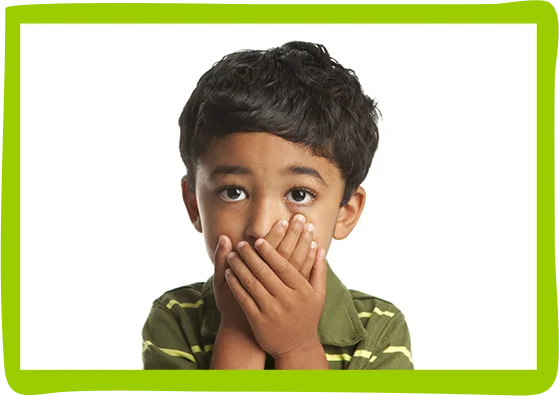I didn’t do it

Most children lie at some stage, lying is part of development and the child is also learning to accept and tell the truth. Catching young ones lying can be frustrating and a huge challenge. This habit can be fixed by changes in parenting style.
Let us consider a scene
You and your child are alone and no third being is present. Your hyperactive child is silent and is working the magic of trouble somewhere in the house. All of sudden you hear a big glass shattering sound . You rush to the spot and find a vase in pieces . You look at victim and search the area for the person behind the crime. And in no time you spot your child in the near by area. Before you ask, your child says “I didn’t do it”. You caught your child red handed. You are furious, not for the vase but on what you just witnessed. You heard you child lie.
Why do kids lie?
One of the most obvious answer is to avoid punishment. It becomes hard for a child to accept the mistake when they know that they may face physical punishment, humiliation or a good tongue-lashing. And can you blame them? Even as an adult, we may do the same when faced with an angry boss or nagging neighbour. The other reason is to avoid loosing favours in the eyes of other. Kids would never want to disappoint their parents. Kids end up lying so they don’t have to see the long faces of their parents.
Lying is undoubtedly a serious misbehaviour and we should address the problem. We should look at the problem with a different perspective. Instead of punishing them on every lie they speak , we should create a safe environment so the kids do not hesitate to speak the truth.
Here are some points to keep in mind when your child is being dishonest.
If your child is worried about being punished or yelled at when they make a mistake, they will not feel safe telling you the truth. Practice using your calm voice and focus on solutions that will solve the problem.
Don’t give your child the opportunity to lie. Don’t ask them the questions when you know the answer. For example, ask them “when do you plan to start working on your project?” ask them about their plans instead of asking “have you done your project?”
When your child is being dishonest, try to understand what made them feel that they couldn’t be honest with you. Instead of calling out about the lie, try saying. "That sounds like a bit of a story to me. You must have felt afraid to tell the truth. Let’s talk about that." You’ll get the honesty you’re looking for, as well as information that may help you foster the truth in the future
Express encouragement when your kids tell the truth. "That must have been difficult for you to tell me what really happened. I admire your courage for telling the truth. You are really growing up!"
Next time you catch your child lying, understand why and analyse your actions. Your child requires a safe place to speak the truth. Provide them the required encouragement and love so they can open up.
Tips for handling lies and laying
Next time when you catch your child lying make a joke, or exaggerate your child’s lie. For example if child explains a broken toy by saying, ‘My teddy bear broke it’. You could ask something silly like, ‘I wonder why teddy did that?’ Keep the joke going until your child owns up. This way, you uncover the lie and teach a lesson without any need for discipline or conflict.
Try to avoid telling your child that he’s a ‘liar’. This label won’t be good for his self-esteem and might lead to even more lying. It’s more helpful to talk about your child’s behaviour. This way you will end up creating a secure place for your child. Your kid will always be truthful to you and in the end that is all what we want. Isn’t it?





